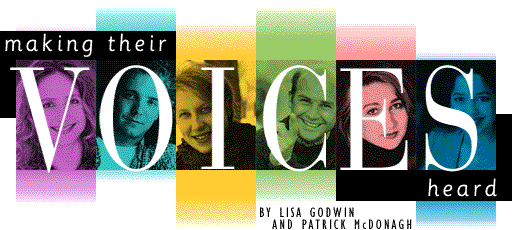
Leo Tolstoy once stormed out of a Wagner opera, calling it a decadent waste of money far removed from the artistic needs of the average man, and indeed opera is still considered by many to be elitist and inaccessible. § For years, legions knew the art form only through "The Rabbit of Seville" and "What's Opera, Doc?" in which Bugs Bunny and Elmer Fudd buffet one another to the strains of Gioacchino Rossini and Richard Wagner. § But recently, the public has been assaulted with versions of this most "high" of art forms.The three tenors pack arenas, even with ticket prices substantially higher than hockey games or tractor pulls.
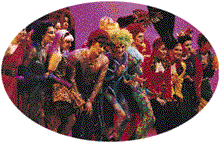
Opera McGill students in a recent performance of Johann Strauss's Die Fledermaus.
At top, left to right: Suzie Le Blanc, Daniel Taylor, LMus'92, Stephanie Marshall, BMus'98, Benjamin Butterfield, LMus'95, Maria Popescu, and Julie Nesrallah, DipArt'97.
| Purists may howl, but the "pop-opera" phenomenon has raised the profile of the art form. While the music is making its way back into public consciousness, the performance remains a distant tributary to the mainstream. Opera companies today are working to overcome this obscurity and to bring opera to a new audience.
Every year, hundreds of young opera singers enter the fiercely competitive market, only to find that more and more is being demanded of them. Some of these hopefuls are former students of the McGill Faculty of Music.
So what does it take to make it in a business flooded with talent? Magical charisma, a beautiful voice, and a roster of technical skills, not to mention the ability to get along with people. The days of the neurotic opera singer are long gone; there are simply too many singers in line to take the job from would-be divas. How can hopeful singers develop those qualities that will help them stand out in the crowd?
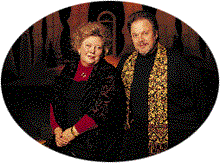
Dixie Ross Neill, Director of Opera Studies, and William Neill, Voice Area Chair.
| If there is a definitive answer, Dixie Ross Neill, Director of Opera Studies at McGill, might be the one to provide it. Her formula? "Before our students go into the world, we try to give them a set of tools. The voice has to be trained, of course, but they also must gain a basic proficiency in the dominant languages of the art form: English, French, Italian, German, and, increasingly, Slavic languages. And they need good basic musical skills."
Neill has a presence that is both powerful and gracious, which has no doubt served her well during her years as a vocal coach and musical director. She began teaching at McGill in 1993, five years after her husband William Neill was hired for the voice program, which he presently chairs. The two native Texans have coached extensively. Their most famous student (from pre-McGill years), Ben Heppner, has been hailed by such authorities as the New York Times as the world's best heldentenor, or "heroic" tenor. Indeed, Heppner, by far the most recognizable Canadian on the international circuit, still visits regularly to work with them.
| hitting the high notes |
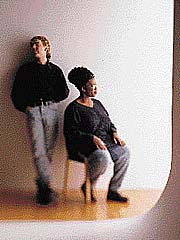
Hailed by Opera Canada magazine as "the premiere program in Canada," the McGill opera program is training top-level singers who are making early forays onto the opera scene.
A number of them have taken on professional roles while studying at McGill, and end up either leaving before graduation, or juggling professional and academic responsibilities. Opera McGill director Dixie Ross Neill feels the singers' success "reflects the quality of the program and the teachers here."
Soprano Ann Rowe, LMus'00, featured on our cover, is a case in point. Still a student in McGill's music program, she has just finished playing the lead in Richard Strauss's Ariadne auf Naxos in Victoria for the Pacific Opera Company, reprising a role she took on for Opera McGill last year to enthusiastic reviews. Rowe has also played Musetta in La Bohème for the Toronto Opera Lyric Theatre and as a student has appeared in La Cenerentola, West Side Story, and most recently, Die Fledermaus at McGill.
The McGill program, she says, is "probably one of the most difficult in North America, and once you've been through it you're considered one of the best trained performers. People I meet in the opera world say 'Oh, you come from McGill. Fantastic!' The reputation speaks for itself. It's a very professional program and they give you a realistic view of what it's like out in the world: auditions, training, acting, stagecraft, everything."
"I definitely feel that Ann is one of the more promising singers in our program," says Ross Neill. "The fact that she was hired by the Pacific Opera to do a leading role there while she's still a student is very indicative of her talent. She has a wonderful flair for the stage and a lot of charisma on the stage, which is very important for singers and can determine whether or not they will have a career. I think we'll continue to see her talent grow, and even though she still has another year at McGill, there will probably be more and more professional things coming up for her."
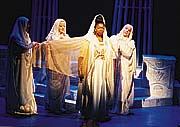
Ann Rowe in the Opera McGill production of Ariadne auf Naxos
Top: Countertenor Daniel Taylor and soprano Ann Rowe
|
The director may be biased, but she also speaks with the voice of authority when she says that McGill's is possibly the best university opera program in North America. She is not alone. Arthur Kaptainis, the respected classical music critic for the Montreal Gazette, says that to find a program of similar quality, "you would have to go to the dedicated professional music schools in the United States." And he gives much of the credit to the Neills: "Their huge success with Ben Heppner is hard to beat. They're obviously attracting people with good potential, which is a dynamic that is hard to establish." There are around 100 singers in the program, with 25 to 30 graduating each year. About half go on to a career in opera, a percentage envied by other universities.
The root of the success may well be the passion conveyed by the program's teachers. "We try to help the singer love the music enough to carry them through any difficulties," says vocal coach Michael McMahon, BMus'78. As a performer himself, McMahon is aware of those things that can get in the way of a singer's confidence on stage. "You know they're not supposed to, but air conditioning or snoring can affect your performance."
But it takes more than a love of singing to attract the level of attention that will have singers strutting their stuff at La Scala. "They must prepare their voice as a product, as well as learn how to present themselves professionally," stresses Neill. "They have to know how to dress, how to walk on stage, how to audition." After all, first impressions are formed at competitions and auditions before any notes are sung.
The opera world demands that singers pay attention to packaging. "People find it difficult to believe in a 300-pound romantic lead or Mimi (from Puccini's La Bohème) dying of consumption weighing 210 pounds," says Julie Nesrallah, DipArt'97. During her last year in school, she landed a "swanky New York agent" who, once the honeymoon was over, minced no words and told her to lose ten pounds. Gone are the days of the obese opera singer with horns on her head: today's Valkyries are more svelte. Opera is developing a younger, sexier image in which health and fitness play a big role. As tenor Benjamin Butterfield, LMus'95, puts it, "Singing depends on physical fitness. You have to be fit enough that you're not focusing on the physical aspect, so you can let the artistic side through." Not to mention that a cold or flu at the wrong time could cost a night at the Met.
But looks alone don't make a character believable. "You have to be able to move around the stage and act," says Ottawa-based lyric soprano Donna Brown, who left McGill before finishing her degree (as many singers do, moving on when opportunity knocks). "You can't just stand there and sing pretty." And she would know: her career now in full bloom, Brown got her first big break in acclaimed British theatre director Peter Brook's production La Tragédie du Carmen. Conveying character is as important as hitting the right notes at the right time.
The most elusive of all requirements is charisma, that most difficult-to-understand and impossible-to-pinpoint quality that riveted millions to Maria Callas. As Brown explains, "It's about spilling out as much emotion and character and personality as you can that makes opera accessible."
Can charisma be taught? "Taught, no. Unleashed, perhaps," says Michael McMahon.
Important as it is, charisma means little without the main requirement: a beautiful voice. Good singers make using their exceptional instrument look easy. "The audience sees a singer as someone who pours out glorious sound. They don't see all the work behind it. It's not a matter of God kissing your vocal cords and beautiful sounds coming out," Neill explains. It is a long, disciplined process which cannot be forced -- doing so could painfully shorten a career. The voice takes time to mature: few singers are ready to enter the professional world before their late twenties.
"You have to be careful when you are young not to do any harm to your voice by abusing it. You have to wait for it to happen," explains Maria Popescu, who at 37 is just starting to hit her prime. She got her first big break when she was called in at the last moment for a role in Berlioz's Les Troyens with renowned conductor Sir Colin Davis. The role was her debut at La Scala, Milan's famous opera venue, and led to a callback to work with the equally renowned Riccardo Muti in a production of Falstaff. Luck plays a big role in most singers' careers, but as Popescu says, it's all about making your luck work for you. "It's really easy to get the first gig. Getting invited back is the hard part." 'Easy' is debatable, but there is no doubt that singers need to keep reminding people that they're out there -- which means auditioning and auditioning and auditioning.
Once out in the world, young singers find themselves struggling to be heard in the cacophony of the music business. As Nesrallah, 30, attests, "Getting a career going is tricky. You go through lots of money. I tell friends, 'Save your pennies!'"
| guilty pleasures |
|
What do opera singers listen to when they aren't singing?
Not each other, apparently, or even themselves.
Daniel Taylor: "I like techno-rock -- Portishead, Propellerheads...and Bjork."
Suzie Le Blanc: "I listen to opera to learn, but I relax with jazz, or sometimes folk-type music: Acadian, African -- I'm Acadian. Things far away from work."
Maria Popescu: "I don't own a sound system -- I have to pay for my daughter's education. But sometimes I just blast the radio, just to fray my mind. And I like a lot of ethnic-type music -- gypsy music from Transylvania, Brazilian jazz..."
Benjamin Butterfield: "I don't listen to a lot of opera -- I like things that cheer me up. I'm kind of shallow and rather easily impressed. But I like Richard Strauss and big decadent things I can never be involved in."
Julie Nesrallah: "I listen to Tom Waits, Keith Jarrett, Miles Davis, Coltrane...and the Rolling Stones. The Stones rule!"
|
A singer must pay a vocal coach, a singing teacher, an accompanist, and a host of incidental expenses. The financial squeeze forced Nesrallah to move back to her parents' house in Ottawa, and even then money evaporated. "I didn't make a red cent last year, even without paying for rent or food," she sighs. "I sang to pay for costly New York auditions and my agent fees." The money dilemma is ubiquitous. "It takes almost ten years before you can make a decent living," explains soprano Dominique Labelle, DipArt'86, who, with bookings into 2002, finally speaks from a position of relative security.
Even for performers with security, professional demands intrude. Daniel Taylor, LMus'92, who actually went through the early music program rather than the opera program, is booked through to 2001. Taylor's performances and recordings are moving him into the ranks of the world's top countertenors (an unusually high tenor voice). He has just finished performing Handel's Rinaldo in Austria, the Netherlands, France and England, sharing a stage with Cecilia Bartoli under the direction of Christopher Hogwood and the Academy of Ancient Music, and in April he makes his Metropolitan Opera debut in Handel's Giulio Cesare. His solo early music recordings are garnering high praise and reeling in prizes -- an Opus award (given to Quebec classical artists) and a Félix award (from the Quebec music industry) for his Henry Purcell and John Dowland CDs. The success is a blessing, but the constant work takes a personal toll. "The harshest reality is that you spend five to eight months on the road essentially alone," he laments.
And travel is exhausting -- when first contacted for an interview, Suzie Le Blanc asked to defer for a week, pleading fatigue after a hectic schedule of performing and recording. For Montreal-based Maria Popescu, who spends approximately half the year in Europe, the work grind takes her away from her eight-year-old daughter. "But she comes with me whenever she can," notes Popescu, who brought her daughter along to Palermo, Italy, while performing in Romeo and Juliet.
According to Benjamin Butterfield, "You try to leave the business side to the agent, and let the artistic side alone be your concern. It's simple: they arrange auditions, and I show up." But sometimes artistic and personal choices run counter to the agent's inclinations. "My agent wants me to sing a certain light lyric style, sticking to Mozart and Rossini," he explains. When interviewed, Butterfield was in Christchurch, New Zealand, performing in Tchaikovsky's romantic work Eugene Onegin under the direction of Brian Law, formerly of the National Arts Centre in Ottawa. Onegin is full of the passion and hyperbole that people most often associate with opera. "My agents weren't happy, but I wanted to move to another stage. Besides, doing this show is a nice break from the rigmarole...I'm out in the New Zealand countryside looking at sheep fields and blue sky."
Most singers agree that learning to accept and overcome rejection is critical to success. In her first year out of school, Nesrallah beat the odds, landing three roles out of 20 auditions. Interestingly, finding roles is considerably tougher for female performers. "It's culturally more acceptable for a woman to go into music," explains Popescu. "There are tons of women at auditions, but tenors are booked for years in advance. There simply aren't as many male singers around."
So why choose a career in such a difficult and risky business? Most singers seem to agree that they didn't really have a choice in the matter. In Taylor's words, "the career finds you."
Stephanie Marshall, BMus'98, describes her own "dramatic decision." Says Marshall, "I was 20, and had been singing for eight years, but then I stopped for a year. One day I was painting my apartment with a friend, and she asked what had happened to my singing. All of a sudden I burst out crying. I had really missed it, and loved it, but had been denying myself for 'practical' reasons and the fear that I wasn't good enough. I realized I had to do it, just to be happy." Marshall is now studying at the Royal Academy of Music in London, England.
Similarly, Suzie Le Blanc was studying harpsichord at McGill and singing seventeenth-century Italian music for fun on the side when she accepted a singing job with the Vancouver-based New World Consort, leaving McGill and the harpsichord behind. "My mother was an opera singer," Le Blanc recalls, "and as a child, I hated opera. That's why I sang early music instead. Now, I'm pursuing more and more opera roles."
But being driven to sing, and prospering at the international level as Popescu, Taylor, Labelle, Brown, Le Blanc and Butterfield have, does not automatically grant one fame and recognition. While some singers (and voice types) have developed something of a cult following in recent years
(Vanity Fair recently featured an article on the world's leading countertenors), most performers remain marginal public figures.
And even if Pavarotti gesturing to the rafters at the local hockey arena has eclipsed opera itself in the public mind, the art form maintains a devoted following who perhaps concur with Nietzsche in considering it to be the perfect marriage of music and drama. "Time stops for me every time I make music," muses Labelle. Taylor elucidates opera's mystical power. "It comes down to that moment on stage when we become absolutely transparent and the audience moves off of us and onto the music. It's a luxury to be a part of that. It's a revolution, abandoning the self in favour of something we cannot control."
Lisa Godwin recently completed doctoral studies in music at Université de Montréal. Patrick McDonagh is a former assistant editor of the McGill News and a freelance writer in Montreal.
| selected discographies |
|
Suzie Le Blanc
Amor Roma: Roman Cantatas, c. 1640, Tragicomedia Instrumental Ensemble -- Vanguard
Moulinie: Airs avec la tablature de luth, with Stephen Stubbs, lute -- CBC Records
Love And Death In Venice: Baroque Arias and Duets -- Virgin Veritas
|
Daniel Taylor
Purcell: On the Muse's Isle, Songs, with Ensemble Da Sonar -- ATMA (solo disc, winner of the OPUS award)
Dowland: Tears of the Muse, Songs -- ATMA (solo disc, winner of the FELIX award)
Handel: Rodelinda, with Cecilia Bartoli, conductor Christopher Hogwood, The Academy of Ancient Music -- Decca
|
Maria Popescu
Rachmaninov: Complete Songs, Volumes 1-3, with Howard Shelley, piano -- Chandos
R. Murray Schafer: The Garden of the Heart, with Donna Brown, conductor Mario Bernardi, National Arts Centre Orchestra -- CBC Records
|
Benjamin Butterfield
Brahms - Schumann - Greer: The Aldeburgh Connection: Liebeslieder and Folk Songs -- CBC Records
Bach: Cantatas from Weimar, Cantatas 12, 18, 61, conductor Jeffrey Thomas, The American Bach Soloists -- Koch International
Purcell: Dido and Aeneas, conductor Jeanne Lamon, Tafelmusik -- CBC Records
|
Donna Brown
Verdi: Don Carlos, conductor Anthony Pappano, Orchestre de Paris -- EMI
Haydn: The Creation, conductor John Eliot Gardiner, Monteverdi Choir, English Baroque Soloists -- Archiv
|
|